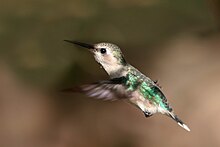Lots of hummingbirds in Coopville, but nothing as tiny as this one!
The Bee hummingbird
| Bee hummingbird | |
|---|---|
 |
|
| immature male | |
 |
|
| Female in flight Both at Palpite, Cuba |
|
| Scientific classification |
|
| Kingdom: | Animalia |
| Phylum: | Chordata |
| Class: | Aves |
| Order: | Apodiformes |
| Family: | Trochilidae |
| Genus: | Mellisuga |
| Species: | M. helenae |
| Binomial name | |
| Mellisuga helenae (Lembeye, 1850) |
|
Adult male non-breeding
Cuba
Cuba
Adult male in flight
Cuba
Cuba
Description
The bee hummingbird is the smallest living bird. Females weigh 2.6 g (0.092 oz) and are 6.1 cm (2.4 in) long, and are slightly larger than males, with an average weight of 1.95 g (0.069 oz) and length of 5.5 cm (2.2 in). As its name suggests, it is scarcely larger than a bee. Like all hummingbirds, it is a swift, strong flier.The male has a green pileum and fiery red throat, iridescent gorget with elongated lateral plumes, bluish upper parts, and the rest of the underparts mostly greyish white. The male is smaller than the female. The female is green above, whitish below, with white tips to the outer tail feathers. Compared to other small hummingbirds, which often have a slender appearance, the bee hummingbird looks rounded and plump.
Female bee hummingbirds are bluish green with a pale gray underside. The tips of their tail feathers have white spots. During the mating season, males have a reddish to pink head, chin, and throat. The female lays only two eggs at a time, each about the size of a coffee bean.
The brilliant, iridescent colors of the bee hummingbird's feathers make the bird seem like a tiny jewel. The iridescence is not always noticeable, but depends on the viewing angle. The bird's slender, pointed bill is adapted for probing deep into flowers. The bee hummingbird feeds mainly on nectar, and an occasional insect or spider, by moving its tongue rapidly in and out of its mouth. In the process of feeding, the bird picks up pollen on its bill and head. When it flies from flower to flower, it transfers the pollen. In this way, it plays an important role in plant reproduction. In one day, the bee hummingbird may visit 1,500 flowers.
Using bits of cobwebs, bark, and lichen, the female bee hummingbird builds a cup-shaped nest that is only about 2.5 cm (0.98 in) in diameter. Nests have been built on single clothespins. She lines the nest with soft plant fibers. In this nest she lays her eggs, which are no bigger than peas. She alone incubates the eggs and raises the young.
Diet
The bee hummingbird has been reported to visit 10 plant species; nine of them were found to be endemic to Cuba. These flowers include Hamelia patens (Rubiaceae), Chrysobalanus icaco (Chrysobalanaceae), Pavonia paludicola (Malvaceae), Forsteronia corymbosa (Apocynaceae), Lysiloma latisiliquum (Mimosaceae), Turnera ulmifolia (Passifloraceae), Antigonon leptopus (Polygonaceae), Clerodendrum aculeatum (Verbenaceae), Tournefortia hirsutissima (Boraginaceae), and Cissus obovata (Vitaceae).Habitat and distribution
The bee hummingbird is endemic to the entire Cuban archipelago, including the main island of Cuba and the Isle of Youth in the West Indies. It is found mainly in Cuba's mogote area and uncommonly in Playa Larga near Zapata Swamp, but has been spotted in western Cuba.Breeding
Side view of the nest
Coevolution with flowers
The bee hummingbird interaction with the flowers that supply nectar is a notable example of bird–plant coevolution with its primary food source (flowers for nectar).
:o)



No comments :
Post a Comment